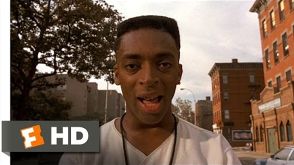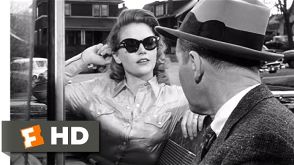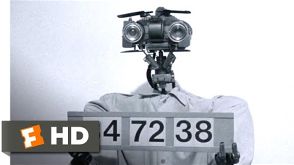Learn real English from movies and books.
Add words or phrases for learning and practice with other learners.
-
STEP 1Watch the video

-
STEP 2Do the exercises

-
STEP 3Add phrases you like to Favorites

21 - Ben Campbell amazing answer
Use the slider to edit the beginning and end of the video clip
Click on the training icons in which you want to add the phrase for further study
- 00:00 / 00:00
Click on a word or highlight a phrase to see translation
Click on a word or highlight a phrase to see translation
Click "plus" to add word/phrase for learning
Click "plus" to add word/phrase for learning
Start learning
Start learning
All right.
Now, who can explain Newton's method and how you use it?
You can use it to solve nonlinear equations.
That's impressive.
That's really good. I mean, I'm very impressed by that,
especially since my class is called Nonlinear Equations.
All right, now somebody tell me something I don't already know.
Anyone? Bueller. Anyone? Bueller.
Newton stole it.
- I'm sorry? - Newton stole it.
Joseph Raphson published this same method 50 years earlier.
If the start value is too far removed from true zero, then it fails.
- I'm sorry, what's your name? - Ben. Ben Campbell.
So Ben Campbell suggests that Joseph Raphson
was the original author of this method.
Well, if that's the case, then why didn't he get any credit?
Well, for one thing, Newton had a better publicist.
And for another, after 1700, we know very little about Raphson
other than the fact that he discovered the Kabbalah
about 300 years before Madonna.
All right, now, let's give Ben a chance for some extra credit, shall we?
We're gonna call this the game show host problem, all right?
Ben, suppose you're on a game show.
And you are given a chance to choose from three different doors, all right?
Now, behind one of the doors is a new car. Behind the other two, goats.
Which door would you choose, Ben?
Door number one?
Door number one. Ben chooses door number one.
All right, now, the game show host,
who, by the way, knows what's behind all the other doors,
decides to open another door. Let's say he chooses door number three.
Behind which sits a goat. Now...
Ben, game show host comes up to you.
He says, " Ben, do you want to stay with door number one
" or go with door number two?"
Now, is it in your interest to switch your choice?
- Yeah. - Well, wait.
Remember, the host knows where the car is
so how do you know he's not playing a trick on you?
Trying to use reverse psychology to get you to pick a goat?
Well, I wouldn't really care. I mean, my answer's based on statistics.
Based on variable change.
Variable change? But he just asked you a simple question.
Yeah, which changed everything.
Enlighten us.
Well, when I was originally asked to choose a door,
I had a 33.3% chance of choosing right.
But after he opens one of the doors and then re-offers me the choice,
it's now 66.7% if I choose to switch.
So, yeah, I'll take door number two, and thank you for that extra 33.3%.
Exactly. People, remember,
if you don't know which door to open, always account for variable change.
Now, see, most people wouldn't take the switch
out of paranoia, fear, emotions.
But Mr. Campbell, he kept emotions aside
and let simple math get his ass into a brand-new car!
Which is better than that goat you've been driving around campus.
All right, everybody.
That's the end of the day. Thank you very much.
Your graded papers are down here at the end.
You can pick them up on your way out.
which
variable
value
trick
remember
explain
newton
exactly
everything
emotions
earlier
little
always
everybody
behind
three
decides
discovered
since
changed
account
choice
class
around
campbell
different
about
fails
other
especially
choose
brand
chance
interest
comes
chooses
author
suppose
after
based
aside
something
called
problem
would
start
before
better
bueller
gonna
choosing
campus
already
another
change
given
statistics
graded
impressed
kabbalah
joseph
anyone
impressive
knows
simple
method
nonlinear
years
goats
number
trying
original
originally
extra
offers
papers
paranoia
question
people
thing
equations
playing
psychology
doors
raphson
published
really
removed
enlighten
opens
switch
where
reverse
credit
right
madonna
shall
solve
driving
asked
Similar video exercises
Click on a word or highlight a phrase to see translation
Click on a word or highlight a phrase to see translation
Click "plus" to add word/phrase for learning
Click "plus" to add word/phrase for learning











